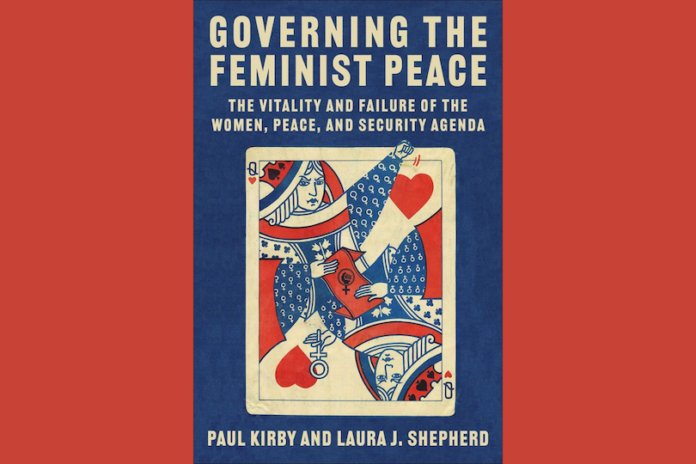Governing the Feminist Peace: The Vitality and Failure of the Women, Peace, and Security Agenda
By Paul Kirby and Laura J. Shepherd
Columbia University Press, 2024
Governing the Feminist Peace introduces fresh, thought-provoking arguments that steer Women, Peace, and Security (WPS) research in new, exciting directions. The authors’ extensive expertise, honed over years of study, is evident in the rich detail provided throughout their first co-authored monograph, offering a credible, well-grounded analysis of the WPS agenda.
Kirby and Shepherd argue that over the past two decades, WPS has often been wrongly reduced to a state discourse or technical apparatus, neglecting the agenda’s relational and multifaceted nature. This reductionist tendency is common in International Relations (IR), particularly under positivist approaches. In contrast, drawing from critical IR, governance theories, politics of emotions, and feminist and post-colonial thought, the authors aim not to simplify but to embrace the complexity of WPS. They engage with the agenda by “seeking not to explain but to involve” (p.26), recognizing their positionality within the broader WPS community.
The book makes five significant contributions to the WPS scholarship. First, it reimagines WPS as a ‘policy ecosystem’ of interconnected actors, activities, and artefacts, highlighting the agenda’s relational multiplicity. Second, it reframes vitality and failure not as binary categories but as inherent to WPS, an ‘archipelago amid a constant tempest’ (p.55). Third, it acknowledges the tensions, fractures, and contradictions intrinsic to any feminist peace project. Fourth, it argues for a more nuanced understanding of WPS, moving beyond a unidimensional view. Finally, to navigate this complexity, the authors employ an exciting technique called ‘bricolage’ (Särmä, 2015), assembling existing and new descriptions, insights, and practices, which they suggest should be used more in IR scholarship.
References
Särmä, S. (2015), ‘Collage: An Art-Inspired Methodology for Studying Laughter in World Politics’, in Popular Culture and World Politics: Theories, Methods, Pedagogies, ed. F. Caso & C. Hamilton, Bristol, UK: E-International Relations
von Hlatky, S. (2022) Deploying Feminism: The Role of Gender in NATO Military Operations, Oxford: Oxford University Press.




